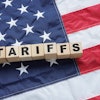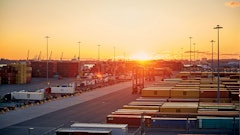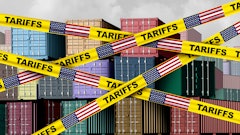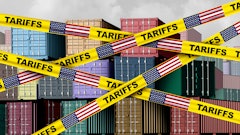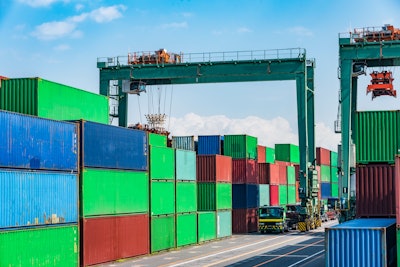
September is traditionally one of the busiest months for U.S. containerized imports, driven by the peak shipping season as businesses prepare for the holiday rush. However, this year presents an unprecedented combination of challenges that could heavily impact supply chains. Potential labor strikes, natural disasters, and tariff uncertainties are converging, creating a highly volatile environment for global trade.
In August, U.S. container cargo imports surged by 12.9% year-over-year, with major ports handling nearly 2.5 million TEUs. While this reflects strong freight demand, it also intensifies concerns as labor strikes loom on Oct. 1, according to Container xChange.
“The possibility of strikes in U.S. East Coast and Gulf Coast port adds uncertainty for container shipping professionals doing business in the U.S.,” says Christian Roeloffs, co-founder and CEO of Container xChange.
Key takeaways:
- For container trading and leasing companies, these disruptions could lead to significant delays and port congestion, impacting equipment turnaround times.
- The International Longshoremen’s Association (ILA), representing more than 85,000 dockworkers on the East and Gulf Coasts of the United States, faces a contract expiration on Sept. 30. As negotiations with the United States Maritime Alliance Ltd. (USMX) show signs of breaking down, a strike now appears increasingly likely, threatening to disrupt nearly half of the nation's ocean trade.
- A brief strike could result in weeks of recovery due to accumulated backlogs. The uncertainty is compounded by the fact that the duration of these strikes is unclear—it could be resolved within weeks or drag on for months, as seen with the West Coast strike last year.
- In the event of labor strikes, East and Gulf Coast ports will experience congestion, delaying container turnarounds. Traders could face increased demurrage and detention fees as containers remain stuck at the port. The backlog of cargo could create equipment shortages, raising leasing rates as demand spikes. Some businesses may be forced to reroute shipments through alternative ports, adding logistical complexities and costs.
- These uncertainties will fuel market volatility for container trading companies, with unpredictable container prices and availability. Traders may have to adjust their sourcing strategies, while maintaining flexibility to adapt to changing market conditions.
- These disruptions could also potentially impact customers.
- Container trading companies should expect fluctuating demand and availability of containers as trade routes realign and U.S. port operations face potential delays. The expected surge in demand for container equipment during the peak season could drive leasing rates upward, especially in the event of prolonged labor strikes or storm-related disruptions.
“Companies should anticipate short-term spikes in demand for leased containers as retailers rush to secure goods ahead of potential disruptions, particularly for seasonal inventory and industrial shipments,” Roeloffs adds. "While the threat of strikes looms large, it’s important to note that U.S. inventories are currently strong due to the pulling forward of orders earlier this year to avoid existing disruptions. This stockpile will act as an essential buffer, mitigating the risk of container rates spiking dramatically due to the strikes.
“Leasing rates may rise sharply as importers seek to secure containers amid potential delays. In this environment, traders will need to diversify their partner networks, sourcing strategies, and explore alternative ports to mitigate container shortages," says Roeloffs. "September is usually crucial for U.S. containerized imports due to the approaching holiday season. However, this year presents compounded uncertainties."




